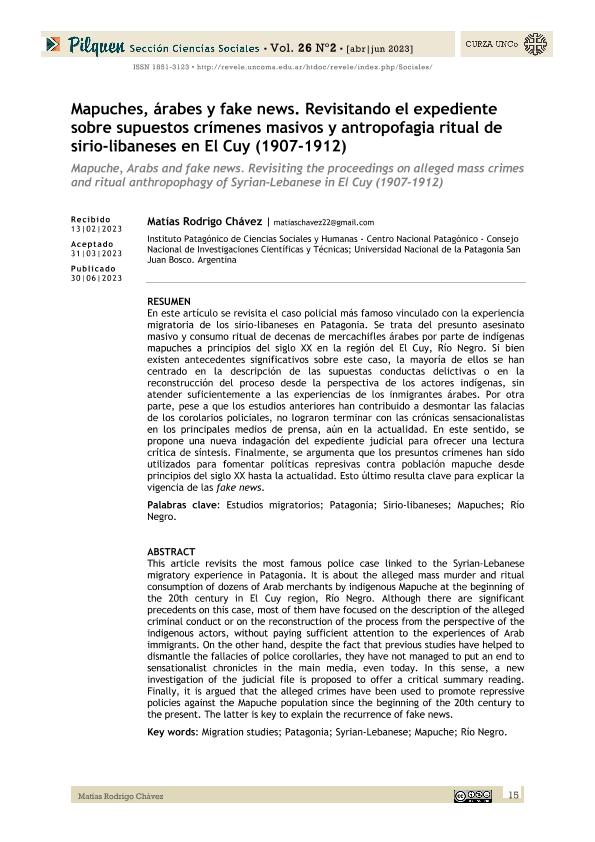Artículo
En este artículo se revisita el caso policial más famoso vinculado con la experiencia migratoria de los sirio-libaneses en Patagonia. Se trata del presunto asesinato masivo y consumo ritual de decenas de mercachifles árabes por parte de indígenas mapuches a principios del siglo XX en la región del El Cuy, Río Negro. Si bien existen antecedentes significativos sobre este caso, la mayoría de ellos se han centrado en la descripción de las supuestas conductas delictivas o en la reconstrucción del proceso desde la perspectiva de los actores indígenas, sin atender suficientemente a las experiencias de los inmigrantes árabes. Por otra parte, pese a que los estudios anteriores han contribuido a desmontar las falacias de los corolarios policiales, no lograron terminar con las crónicas sensacionalistas en los principales medios de prensa, aún en la actualidad. En este sentido, se propone una nueva indagación del expediente judicial para ofrecer una lectura crítica de síntesis. Finalmente, se argumenta que los presuntos crímenes han sido utilizados para fomentar políticas represivas contra población mapuche desde principios del siglo XX hasta la actualidad. Esto último resulta clave para explicar la vigencia de las fake news. This article revisits the most famous police case linked to the Syrian-Lebanese migratory experience in Patagonia. It is about the alleged mass murder and ritual consumption of dozens of Arab merchants by indigenous Mapuche at the beginning of the 20th century in El Cuy region, Río Negro. Although there are significant precedents on this case, most of them have focused on the description of the alleged criminal conduct or on the reconstruction of the process from the perspective of the indigenous actors, without paying sufficient attention to the experiences of Arab immigrants. On the other hand, despite the fact that previous studies have helped to dismantle the fallacies of police corollaries, they have not managed to put an end to sensationalist chronicles in the main media, even today. In this sense, a new investigation of the judicial file is proposed to offer a critical summary reading. Finally, it is argued that the alleged crimes have been used to promote repressive policies against the Mapuche population since the beginning of the 20th century to the present. The latter is key to explain the recurrence of fake news.
Mapuches, árabes y fake news: revisitando el expediente sobre supuestos crímenes masivos y antropofagia ritual de sirio-libaneses en El Cuy (1907-1912)
Título:
Mapuche, Arabs and fake news: Revisiting the proceedings on alleged mass crimes and ritual anthropophagy of Syrian-Lebanese in El Cuy (1907-1912)
Fecha de publicación:
07/2023
Editorial:
Universidad Nacional del Comahue
Revista:
Pilquen
e-ISSN:
1851-3123
Idioma:
Español
Tipo de recurso:
Artículo publicado
Clasificación temática:
Resumen
Palabras clave:
ESTUDIOS MIGRATORIOS
,
PATAGONIA
,
SIRIO-LIBANESES
,
MAPUCHES
Archivos asociados
Licencia
Identificadores
Colecciones
Articulos(IPCSH)
Articulos de INSTITUTO PATAGONICO DE CIENCIAS SOCIALES Y HUMANAS
Articulos de INSTITUTO PATAGONICO DE CIENCIAS SOCIALES Y HUMANAS
Citación
Chávez, Matías Rodrigo; Mapuches, árabes y fake news: revisitando el expediente sobre supuestos crímenes masivos y antropofagia ritual de sirio-libaneses en El Cuy (1907-1912); Universidad Nacional del Comahue; Pilquen; 26; 2; 7-2023; 15-34
Compartir




